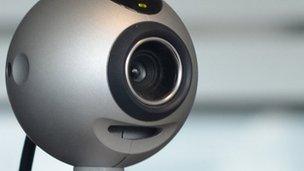Rented computers secretly photographed users having sex
- Published

Users should be extra careful when using machines that do not belong to them, experts said
Rented computers from seven different companies secretly took photographs of their users, US authorities have said.
The companies used software made by US company Designerware which could track key strokes and other personal data.
The software, called PC Rental Agent, captured people engaging in "intimate acts", including sex.
The Federal Trade Commission said the spying breached regulations and banned the companies from using the software.
However, some software - such as location tracking - could still be used as long as the companies involved made it explicitly clear to the users.
It is believed that PC Rental Agent has been installed in approximately 420,000 computers worldwide.
The Federal Trade Commission ruling, external concerned a feature in the software, called Detective Mode, which would typically become activated if the user was late in returning equipment, or failed to pay for use.
Detective Mode would assist the rental store in locating the overdue computer in order to pursue its return.
Part of the process involved a pop-up window designed to look like a software registration screen.
It would request personal information such as email addresses and telephone numbers that could then be used to pursue the users for payment and/or the return of equipment.
'Partially undressed'
In addition, the FTC said the software had access to much more sensitive information, including: usernames and passwords for email accounts, social media websites, and financial institutions.
Among the other data collected were social security numbers; medical records; private emails to doctors; bank and credit card statements.
Webcam pictures of children, partially undressed individuals, and intimate activities at home were also found.
In the FTC's formal complaint document, external, it said the software had captured "couples engaged in sexual activities".
Graham Cluley, from UK-based computer security firm Sophos, said the case highlighted the need for people to be especially cautious on machines they do not own.
"Whenever you're using someone else's computer, whether it's borrowed or rented, you can't always know all of the software on it and what it might be doing," he told the BBC.
"If you are entering an agreement to rent a computer, read the small print, and maybe think twice about doing anything too personal on them."
Designerware could not be reached for comment.
- Published22 May 2012
- Published21 May 2010